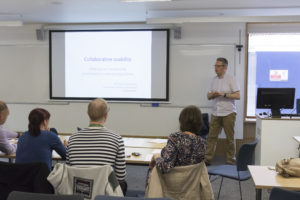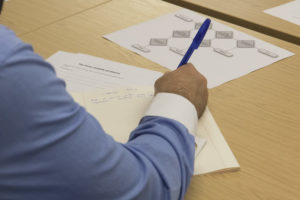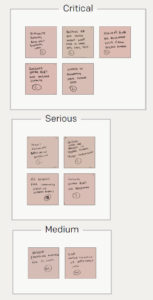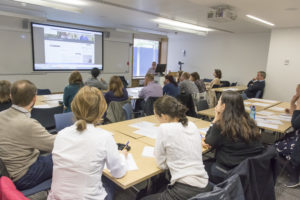Postgraduate applicant experiences – usability testing showcase session
Our final Usability Testing Service showcase session of the summer (30 June) focused on the prospective postgraduate experience using the Degree Finder and associated websites.
Working with colleagues from the Communications and Marketing Digital Team, we focused on students gathering the basic information needed for the early stages of their decision making process:
- Entry requirements
- The application process
- Cost of study
- Funding opportunities
Once again, there was a lot of demand for the session with over 20 colleagues from across the University coming along to learn more about our usability testing processes and get some insight into student online experiences.
I was especially pleased by the reactions of marketing and recruitment colleagues who hadn’t previously encountered our work. This enthusiasm has led to arrangements for a re-run of the session for staff that couldn’t make it and an unsolicited promotional write-up being produced for the regular marketing newsletter.
The insight we gained was invaluable and will help us improve our postgraduate degree finder. This new service is an easy way to embed essential user insight into web or systems development and we highly recommend giving it a go.
Sarah Colegrove, Senior Marketing Officer for the College of Humanities and Social Sciences
Following our usual processes, we tested a scenario agreed with Communications and Marketing which revolved around an undergraduate student in the field of Divinity investigating postgraduate research opportunities. We did this with the support of staff in the School of Divinity, who will be attending the upcoming repeat session. While the Digital Marketing Team were interested primarily from the perspective of how they design the degree finder interface and content structures, school based marketing staff will no doubt focus more on the nature of the content they’re providing.
Findings from the session
As ever, I led the group through the process of logging the issues they saw, consolidating and prioritising them so that they could be passed back to the Digitial Marketing Team to take forward. I was really impressed by how quickly the team picked up on this, with list of actions and timescales produced within days and distributed to everyone who attended.
Thank you so much for this, we found it incredibly useful. Watching a fresh pair of eyes attempting to carry out key tasks really shines a light on the stumbling blocks.
Lesley Middlemass, Digitial Marketing Officer, Communications and Marketing
Did you attend? Tell us what you thought
Leave a comment on this post to tell us, and our readers what you think of the session and the service. This is a pilot, so feedback is essential if we are to continue.
Learn more about the service
If you’d like to discuss how the Usability Testing Service may be able to help you, get in touch.






A low cost approach to collecting qualitative feedback with a list of actions at the end. What is not to love? Should be used as standard for anyone serious about giving their users what they want.
Thanks Russell.
I think the technique is also a compliment to more traditional market research activities like surveys and focus groups delivered by experts like yourself.
I recommend combining research techniques for maximum insight, which is greater than the sum of the parts.
A really enlightening, informative and well structured session. I would definitely like to try out usability testing in my School. It’s also made me think about how I structure my own web content.
The session was well run. the structure of the videos (user view and user with commentary) were vital to understanding how people interact with parts of the website.
The session was immensely useful and I would like to it form part of a core group of training courses that all University staff should enrol on. the insight provided into user behaviour was invaluable.
If this session were made available again, I’d attend and recommend the rest of my colleagues to join. The techniques used to conduct the observation tests were communicated clearly. Implementing usability testing into systems design methodology (a step that is sometimes overlooked) would deliver a richer experience for end users. Overall a great session, definitely worth the time.
Additional comment received via email:
“The session was very well run. I found the experience enlightening; extremely valuable.
I would absolutely like to attend again if more sessions were organised for Communications and Marketing.
This is something I’m recommending to other colleagues in my department, and have added it to the Marketing newsletter we distribute to marketing colleagues around the University.
I’m looking forward to trying this out for myself too.”